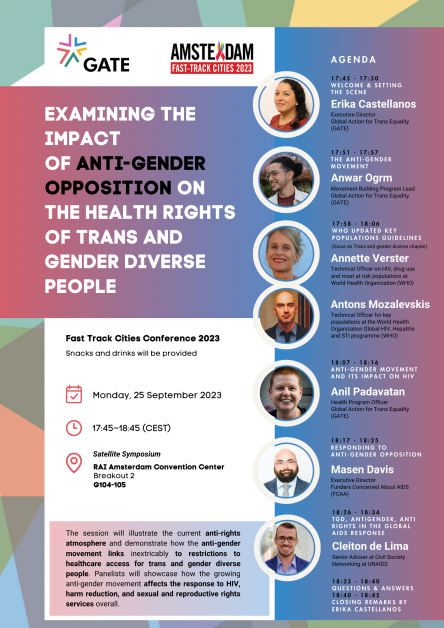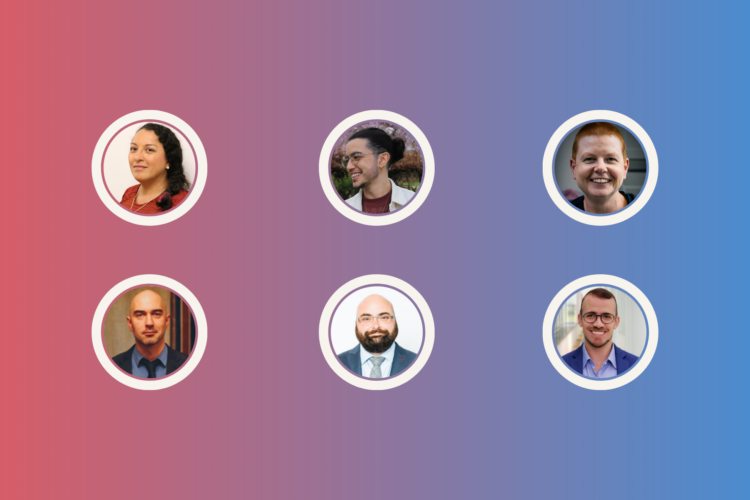At the Fast Track Cities 2023 Conference in Amsterdam, GATE will be hosting a Satellite Symposium on how anti-gender opposition impacts the health rights of trans and gender diverse people.
The session called “Examining the impact of anti-gender opposition on the health rights of trans and gender diverse people” will be introduced by Erika Castellanos, GATE’s Executive Director, and will bring the remarkable contributions of Annette Verster & Antons Mozalevskis from World Health Organizations, Masen Davis, Executive Director of Funders Concerned About AIDS (FCAA) and Cleiton Euzébio de Lima, Senior Adviser at the Civil Society Networking at UNAIDS. GATE’s Movement Building Lead, Anwar Ogrm, will introduce the anti-gender movement and our Health Officer, Anil Padavatan, will explain how this movement has impacted HIV work for trans and gender diverse communities.

What is the Fast Track Cities 2023 Conference?
The Fast Track Cities Conference is an event Organized by the International Association of Providers of AIDS Care (IAPAC), in collaboration with the Joint United Nations Programme on HIV/AIDS (UNAIDS), the Fast-Track Cities Institute, and other partners. This year, the conference will occur at the RAI Amsterdam Convention Center and aims to highlight successes achieved across the Fast-Track Cities network, address cross-cutting challenges faced by local stakeholders, and share best practices in accelerating urban HIV, TB, and HCV responses.
The Fast-Track Cities 2023 conference will provide a space for interactive dialogue and facilitate the collaborative development of innovative approaches to ending HIV and TB, as well as eliminating HBV and HCV.
During GATE’s satellite symposium, you will learn how human rights issues connect to health rights
The anti-gender movement opposes gender theory and seeks to maintain traditional gender roles and identities. Individuals and organizations believe that there are only two distinct and unchangeable genders, male and female and that any attempt to challenge these binaries threatens traditional values and societal order. Their rhetoric and actions often contribute to creating a hostile environment, leading to increased discrimination, stigmatization, and marginalization. This can have a profound negative impact on the mental and physical health of trans and gender diverse communities, exacerbating existing health disparities and hindering access to vital healthcare services and support networks. It can lead to barriers in accessing gender-affirming healthcare, including hormone therapy, surgeries, and mental health support.
The current backlash against access to gender-affirming health care must be seen in terms of the broader attack on the right to bodily autonomy and access to health rights, particularly sexual and reproductive health rights. The anti-gender movement is one facet of a broader anti-human rights movement, which seeks to reverse the gains made in past decades toward the realization of rights for marginalized communities. It threatens important public health programmes, including HIV responses, harm-reduction programmes, and access to sexual and reproductive rights for women and girls. Therefore, we must build cross-movement solidarity and work together to address the inequality, stigma and discrimination that continues to be the driver of poor health outcomes.
The session will illustrate the current anti-rights atmosphere and demonstrate how the anti-gender movement links inextricably to restrictions to healthcare access for trans and gender diverse people. Panelists will showcase how the growing anti-gender movement affects the response to HIV, harm reduction, and sexual and reproductive rights services overall.
Learning Objectives
By the end of the session, participants will be able to:
- Understand what the antigender movement is.
- Learn how the anti-gender movement impacts healthcare access for trans
and gender diverse people. - Identify how they can contribute to safeguarding the health rights of trans
and gender diverse people.
If you are attending the Fast Track Cities Conference, join us on Monday 25 September at 17:45 CET to find out more!





